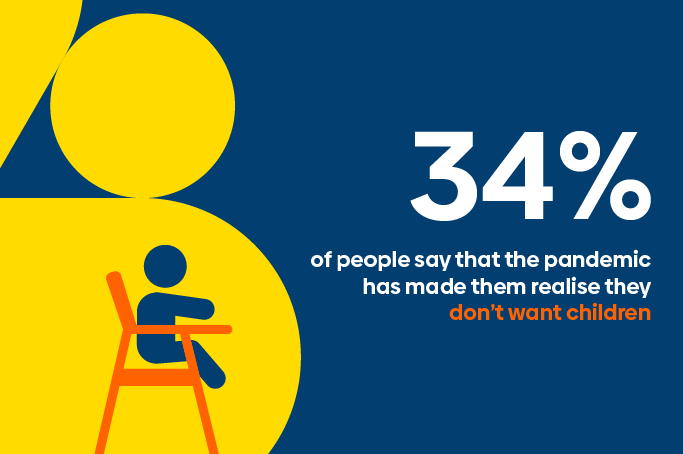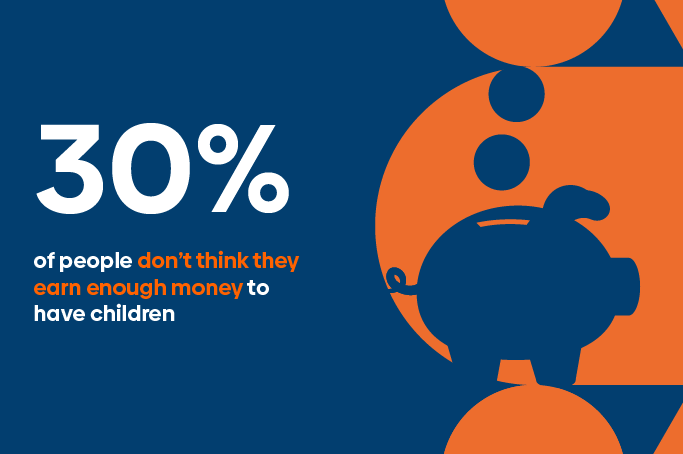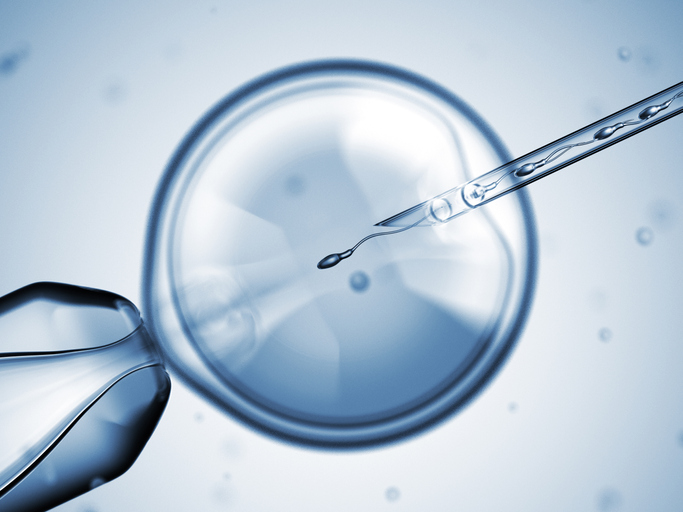The birth rate in England and Wales has fallen by 15.9% since 2012, according to the latest figures from the Office of National Statistics (ONS) – and a Healthily survey shows concerns about money are one of the main causes.
A new poll by Healthily indicates that the Covid pandemic may have played a role in falling birth rates. Some 34% of the 1,000 25 to 35-year-olds surveyed said COVID-19 had made them realise they no longer wanted children.
Of those who said they had decided against having kids, 22% said this was due to life uncertainties and 13% blamed financial reasons.
The total fertility rate (the average number of live children that a group of women would bear if they experienced the age-specific fertility rates of the calendar year throughout their childbearing lifespan) reached a new low in 2020 when it dropped to 1.58 children per woman, the lowest level since records began in 1938. The fertility rate has declined across all age groups. The number of live births in 2020 was 613,936 – the lowest number since 2012 and the fifth consecutive year the number has fallen.
The average age for giving birth is now 30.7.
The ONS says other possible reasons for the falling birth rate include improved access to contraception, a reduction in deaths in children under five (resulting in fewer subsequent pregnancies) and lower levels of fertility or difficulties conceiving.

The top 7 reasons people give for putting off having children
Our 1,000 respondents were asked what barriers were stopping them from having children right now.
Here are their top 7 reasons.
1. Worried about not earning enough money – 30%
The top barrier identified in the survey was that respondents felt they weren’t earning enough money to support having a child.
The average cost of raising a child to the age of 18 is now estimated to be £160,692 for a couple and £193,801 for a lone parent. This is a 13% increase for couples since 2012 and a 25% increase for lone parents. Costs have risen sharply in the past year by 3.6% for couples and 3.3% for lone parents.
Dr Aleem Qureshi GP and Healthily clinical lead says: “Those costs appear to be maybe making people think twice before taking the plunge into parenthood. It’s possible job insecurity during the pandemic, the end of the furlough scheme and rising prices may also have compounded financial worries for would-be parents.
“Clearly, the pandemic has been a worrying time for us all and our survey reveals the impact the uncertainty appears to have had on people making important life choices,” adds Dr Qureshi.

2. Children will restrict their current lifestyle – 21%
Among the top 3 reasons identified as barriers to having children is that some people feel kids will restrict their lifestyle.
One in 5 said being unable to maintain their lifestyle was a barrier to having kids. Again, this may reflect the impact of housing costs and rising prices such as food and fuel bills.

3. Lack of suitable housing – 18%
Whether it’s renting or living in accommodation that does not feel suitable for children, a lack of appropriate housing may play a role in the decision to not have children.
This is not surprising given house prices rose by 13% in the UK between June 2020 and June 2021. The average house price was £226,000 in June 2021 – £31,000 higher than just a year before.
Social housing is also in short supply – the Affordable Housing Commission says that based on current trends, a further 400,000 rented homes could be lost, meaning social housing would represent just 11% of the nation’s homes by 2045.
4. Diagnosed health conditions – 16%
Diagnosed health conditions can have an impact on the decision to have children.
“Health can be a significant factor in the decision to have children. You or your partner may have a condition that affects your fertility such as a low sperm count, endometriosis or polycystic ovary syndrome (PCOS). Or it may be you have a health problem that makes pregnancy more risky, or one that will make bringing up children difficult. It's important to optimise treatment, if possible, for any health problems you have and consider how these will affect pregnancy and bringing up children,” says Dr Qureshi.
“Losing weight if you’re overweight, giving up smoking, eating a healthy diet and cutting down on alcohol can all help improve your health and the chances of a healthy pregnancy,” he adds.
5. Want to concentrate on career first – 16%
There has been a major shift in the last century in terms of more women working and progressing their careers. Employment rates amongst women aged 25 to 54 rose from 57% in 1975 to a high of 78% in 2017.
Despite the cliches of women being warned not to ‘leave it too late’ to have a child only 16% of women in the Healthily poll said that they wanted to see career progression before concentrating on a family. This was less of a concern than earning enough money or finding the right partner.
6. Undiagnosed health worries – 11%
Conditions like PCOS, being overweight, an irregular menstrual cycle, endometriosis or a low sperm count can all affect your ability to conceive, as can smoking. And these concern 11% of our respondents.
“It’s important to speak with a doctor if you’ve been trying unsuccessfully for a baby for a year (or 6 months if you’re over 35). They’ll be able to discuss any symptoms you may have and investigate any possible causes,”says Dr Qureshi.
7. Judgment – 6%
Finally, 6% of those surveyed felt that they didn’t want to have children for fear of being judged by friends and family or by society as a whole.
This appears to affect both younger and older women, though it’s unclear as to whether this relates to older women being judged for having children too late or younger women for having them too young – or other reasons.
The survey highlights how the current health, economic and social climate caused by COVID-19 may be affecting the decision to have children in the UK.
If you you want to learn more about your sexual health, fertility or your ability to conceive, you can check out our Health Library for some great information. Also download our app and Smart Symptom Checker.






